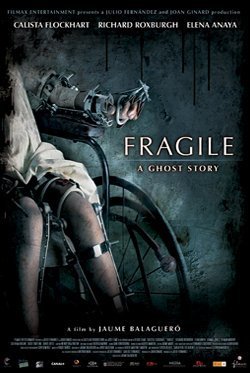—New York Times American Horror Story review
One of these things is not like the others!
It’s perfectly reasonable for critics to take issue with portrayals of disabled characters that use them as a genre trope or try to shock the audience with the disabled character’s appearance. Lots of horror movies and TV shows do this.
(While we’re on the subject can I just show you my favorite horror DVD cover of all time:

LOLOL. Terrifying.)
However, I really wish critics, in their rush to be sensitive about disability issues, would actually take a step back and look at what they’re saying. Which in this case, seems to boil down to the idea that a person with Down Syndrome is the same as a jar with part of a dead baby in it. And that an actor with a disability that affects their appearance would only be cast in a TV show or movie as a circus freak.
To be fair, I don’t really think this critic would be against an actor with Down Syndrome appearing in some kind of inspirational/depressing movie about the family of someone with a disability. I don’t think they would consider that a “freakish” performance. But in addition to the fact that you shouldn’t assume all disabled characters in the horror genre are functioning as freaks, I’m also not sure why critics are quick to jump all over the “insensitivity” of characters like Addie in AHS, when they don’t seem especially plugged in to notice what is wrong about more “tasteful” portrayals of disability—which in my opinion can be equally offensive.
I definitely don’t speak for all disabled people when I say this, but I prefer horror tropes of disability to tasteful tropes. Disabled horror characters have style—rusty, terrifying wheelchairs and braces more suited for steampunk conventions than actually helping someone get around. Their unsteady gait isn’t depressing, it stops you in your tracks with fear. If they’re bad, they kill people, and if they’re good, they can help you with their psychic powers. They’re not people to underestimate.
Of course they’re usually shitty characters, but as shitty characters go, I love them a lot. And because their very nature means they are not “tasteful,” they often become more human and likable than the disabled characters in a straight-faced portrayal of disability.
I wish that critics would wait to talk about disability until they’re ready to actually care about it and engage with it genuinely. The more I see people complain about Addie on AHS—in exactly the same way, and for some reason never mentioning other disabled characters on the show, like she’s the agreed-upon thing that’s offensive—the more it looks like they’re doing it to earn some kind of merit badge. “I’m sensitive to portrayals of disability in pop culture!” No, you’re not. Because if you were, you would care about things like whether disabled characters are unique, have realistic problems, are charismatic, are POV characters, and don’t tragically die at the end of the movie. Your primary focus wouldn’t be whether you can lazily compare Jamie Brewer to the actors in Freaks—which happens to be a great movie despite not being “tasteful” in the slightest.
As long as so few disabled characters are good, it’s really hard for them to be notably bad, and there’s something so clueless about condemning Addie Langdon when there are so many worse characters running around in this and other genres. In the end it doesn’t matter if the Burned-Face Man chokes you with a pillow in the attic, or a Lifetime mom ends your suffering in a more wholesome way—you’re going to die in there.


"I definitely don’t speak for all disabled people when I say this, but I prefer horror tropes of disability to tasteful tropes. Disabled horror characters have style—rusty, terrifying wheelchairs and braces more suited for steampunk conventions than actually helping someone get around. Their unsteady gait isn’t depressing, it stops you in your tracks with fear. If they’re bad, they kill people, and if they’re good, they can help you with their psychic powers. They’re not people to underestimate.
ReplyDeleteOf course they’re usually shitty characters, but as shitty characters go, I love them a lot. And because their very nature means they are not “tasteful,” they often become more human and likable than the disabled characters in a straight-faced portrayal of disability."
That..is effing brilliant! And it's not just you.
To elaborate and seem a bit less incoherent,
ReplyDeleteI love your post truly. I feel that the villains are often the ones I love the most out of any story, as well as amoral and dark characters.
The only real problem I have with disabled villains is when they're angry/depressed/seeking revenge because they got disabled and obviously that makes you a homicidal maniac!
I feel that often the good characters are boring, or obvious, or an ideal, or a stand-in, but not this likable. Not this human. Not the same way the characters that cross the lines are.
(If this is confusing, sorry. It's late.)
-MGB
I know this post is old but I just finished season 1 of AHS. And for whatever it says about me...I loved Addie as a character. Of many, many things that were Wrong about that show...I don't think she was it.
ReplyDelete(This is chavisory. Your blog things I'm anonymous, too, for some reason.)